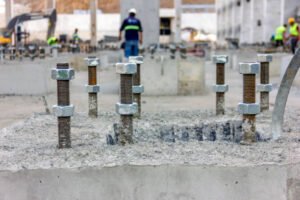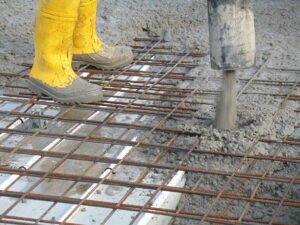A concrete foundation forms the essential base of any residential or commercial construction project. It plays a critical role in ensuring structural stability, long-lasting durability, and overall safety. In this in-depth guide, we’ll cover everything you need to know about concrete foundations, from the various types and installation process to common issues like cracks and repair solutions. We’ll also clarify the often-confused difference between cement and concrete to give you a well-rounded understanding of these foundational materials.

Types of Concrete Foundations
There are several types of concrete foundations, each suited for different structures and soil conditions:
1. Slab-on-grade foundations
Ideal for warmer climates, this involves pouring a single layer of concrete directly on the ground.
2. Crawl space foundations
These raise the structure above ground level, allowing easy access to plumbing and wiring.
3. Basement foundations
Often used in colder climates, these provide additional living or storage space.
4. Pier and beam foundations
Best for unstable soil conditions, piers support the load while beams distribute it.
Choosing the right type is critical for longevity and performance.
Concrete Foundation Installation
Proper concrete foundation installation requires meticulous planning, from soil testing to excavation, formwork, mixing, pouring, and curing. A professional contractor will ensure:
- Accurate site preparation
- Quality formwork and reinforcement
- Proper concrete mix ratios
- Adequate curing time for strength
For homeowners, DIY concrete foundation projects are possible but typically not advisable for large-scale jobs. Mistakes in mixing or curing can compromise structural safety.
Concrete Foundation Cost
Concrete foundation cost depends on several factors:
- Type of foundation
- Soil condition
- Labor and material costs
- Location and climate
Residential concrete foundation costs can vary depending on the type of foundation, site conditions, and project complexity. Factors such as soil analysis and necessary permits also influence the overall expenses.
Concrete Foundation Repair
Over time, concrete foundation issues like settling, shifting, or cracking may occur. Typical cracks include vertical, diagonal, and hairline types, often caused by soil movement or moisture changes.
- Hairline cracks from shrinkage
- Vertical cracks from settling
- Diagonal cracks from soil movement
Concrete foundation repair options include:
- Epoxy injections
- Piering or underpinning
- Slab jacking
Timely repairs are crucial to prevent further structural damage. If you notice signs like uneven floors or sticking doors, consult a professional immediately.
Residential vs. Commercial Concrete Foundations
Residential concrete foundations are generally simpler and less costly compared to commercial concrete foundations, which must meet stringent codes and support heavier loads.
Commercial projects may include:
- Reinforced concrete for industrial equipment
- Post-tension slabs
- Deeper footings
Understanding these differences is vital for accurate budgeting and planning.
Cement vs. Concrete: What’s the Difference?
The cement vs concrete debate often confuses homeowners. Here’s the key distinction:
- Cement is a binding material made from limestone, clay, and other minerals.
- Concrete is a composite material made by mixing cement, water, sand, and aggregates.
1. What is Cement Made Of?
Cement is primarily composed of:
- Limestone
- Clay
- Iron ore
- Gypsum
These ingredients are heated in a kiln and ground into a fine powder.
2. What is Concrete Made Of?
Concrete includes:
- Portland cement
- Water
- Fine aggregate (sand)
- Coarse aggregate (gravel or crushed stone)
3. Uses and Properties
Uses of Cement Include:
- Mortar: Used to bond bricks, stones, and blocks together in masonry construction.
- Plaster: Applied as a smooth coating on walls and ceilings for a finished look.
- Grout: Fills gaps and seals joints in tiles and masonry, providing stability and water resistance.
Uses of Concrete Include:
- Foundations: Form the structural base for homes, buildings, and other constructions.
- Pavements: Used in sidewalks, driveways, and roadways for durability and load-bearing capacity.
- Bridges: Provide the strength and support needed for heavy traffic and long spans.
- Retaining Walls: Hold back soil in landscaping and construction, preventing erosion and land movement.
Properties of cement:
- Fast-setting
- High compressive strength
Properties of concrete:
- Durable
- Fire-resistant
- Versatile
5. Mixing Cement and Concrete
The proper ratio for mixing cement and concrete is critical. A common mix is 1:2:3 (cement:sand: gravel), with water added to achieve the right consistency.

Conclusion
Whether you’re building a new property or repairing an existing one, having a clear understanding of concrete foundations and their connection to materials like cement is vital for structural integrity and long-term reliability. A well-built foundation depends on expert workmanship and high-quality materials. When it comes to concrete foundation installation, repairs, or building durable concrete steps, trust the professionals at Big D’s Concrete LLC to deliver exceptional results tailored to your specific project needs and site conditions.
FAQS
Q1. How many types of concrete foundations are there?
There are four main types of concrete foundations: slab-on-grade, crawl space, basement, and pier and beam. Each type is chosen based on soil conditions, climate, and building needs.
Q2. Which one is the best, cement or concrete?
Cement and concrete serve different purposes, so one isn’t “better” than the other. Cement is an ingredient in concrete, which is the stronger, more durable material used for construction.
Q3. What service areas does Big D’s Concrete LLC cover?
Big D’s Concrete LLC serves Fort Worth, Arlington, Mansfield, Grand Prairie, and surrounding areas, offering expert concrete foundation, repair, and flatwork services. Contact us to confirm your location.
